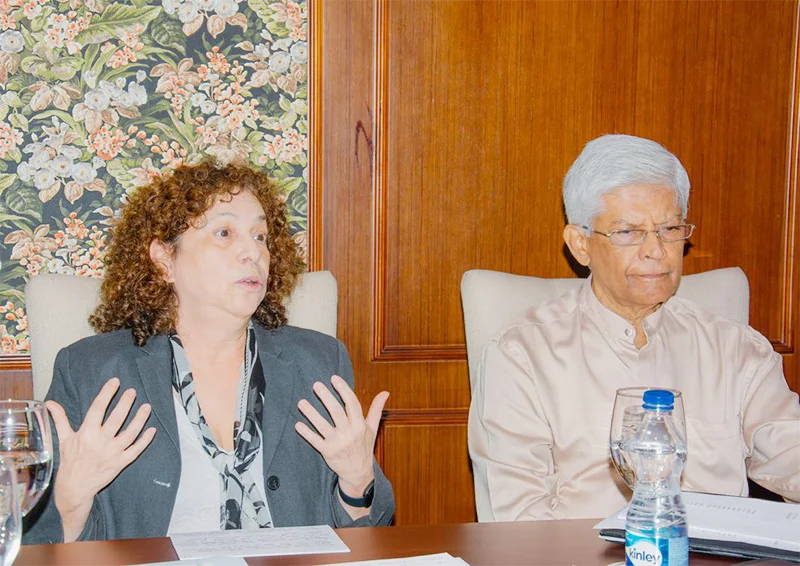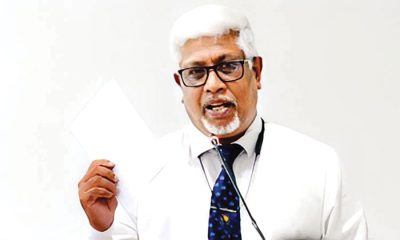Features
English as language of higher education? Some FB responses

By Dr Laksiri Fernando
Before writing this missive, I posted the proposal ‘Sri Lanka’s language of higher education should be English’ and requested my FB friends to ‘express their views.’ Within 24 hours, there were 29 ‘thumps up’ and 65 comments. This is the first time that I realised that the FB could be mobilised at least in a small way in promoting (good) ideas.
Would it be a good idea to shift back to English medium? What would be the advantages and disadvantages to the graduates and the country?
Some Concerns
Above are the questions that would be discussed in this article, based only on FB comments. Names are not mentioned as I don’t have their permission. At the outset, I must say that there were concerns expressed whether this could undermine the Sinhala language? A particular friendly comment was in Sinhala, but it was immediately translated into English by FB! I was surprised. This was the first time I realised that FB has an instant translation programme for the benefit of the users.
The comment in Sinhala was the following:
isxy, NdIdj ;sfhkafka wfma rfÜ ú;rhs’ isxy, orejkag bxY%Sisfhka wOHdmkh ,ndÈh hq;af;a fojk NdIdjla f,iskah’ cmka Ök fldßhka reishka rgj, fuu fïkshdj ke;’¶
FB gave the following translation instantly:
“Sinhalese Language is there only in our country. Sinhalese children should be taught in English as a second language. There is no such mania in Japan, China, Korea, Russian countries.”
Of course, in my FB posting I didn’t give details, and it is correct that the shift to English medium in higher education should not be promoted as a ‘mania.’ There is no superiority in English, except it has become an international language. It should be a practical and a pragmatic decision. If such a ‘mania’ exists in the country, it should be corrected or discouraged. Among other commenters, none expressed such a mania existing.
Let me tell you an anecdote. In 1999, I came to the idea that there can be a software programme/s that could translate Sinhala and Tamil into English and vice versa and made a proposal to the then VC of the University of Colombo. I gave some examples how it could work. I made the same proposal to the then Chair of the Official Languages Commission. But there were no opportunities at that time in the country to do so. A friend of mine sarcastically asked me whether I have the computer knowledge to do so and I said ‘no.’ I mention this anecdote to say that such software programmes, now apparently available in audio form as well, could be utilised to teach English to Sinhala and Tamil students effectively.
Some of the short positive comments were: ‘totally agree,’ ‘perfectly said,’ ‘should be,’ ‘definitely,’ ‘agree,’ ‘yes,’ ‘yes of course,’ ‘exactly,’ ‘true’ and so on.
Some commenters took more time to explain their positions. The first I received was “I think a timely needed requirement. It can be started and gradually enhanced. Already study activities are conducted in English at the University [of Colombo] but need to formalise and enhanced further.” Yes, to my knowledge and experience at the University of Colombo and Wayamba University even in the field of Arts, English is promoted positively. These should be formalised and enhanced in other universities as the commenter said.
School Education
Then came the suggestions for gradual expansion of English in school education: “Starting from grade 5, an important place should be given to English. So, it is easy for students to do higher education in English then.” Progressive promotion of English was the main idea of the commenter. Others expanded on the subject.
A prominent female educationist explained the proposal saying “It should begin at the primary level. Language can easily be adopted in the childhood rather than in adult age.” She also emphasised like others, “Going with English medium [in higher education] doesn’t mean neglecting our heritage, culture, traditions or our mother languages (Sinhala/Tamil). We can express our heritage better in the internationally recognised language. In this period, we thoroughly need people who think out of the box.”
She also came up with some practical suggestions. In promoting English in schools, “If there are lack of teachers, the opportunity could be given to new graduates who have passed out from the Faculty of Education and Teacher Training Schools” she suggested. The implication was that these graduates even at present are given a fair English teaching ability.
There were further suggestions I could fully agree. “The whole education system should be revised according to the global needs. We are still sticking to the traditional teaching methods and syllabuses. This is not only in schools but also in higher educational institutes based on the same structures and old paradigms.” There were some other positive proposals in her interactive intervention. She always talked about ‘Sinhala and Tamil’ when referring to national languages and her primary vision was for the benefit of young generations. She also mentioned other international languages.
There were similar views expressed by a former schoolteacher with international experience. Enhancing “English language teaching should start from the school system…the first step should be to revise school subjects and syllabuses. When promoted from primary level, students will be able to improve their skills in reading, writing, and speaking gradually by the O/L. Most important is to promote skilled and qualified teachers through teacher training and utilising them all over the island by the education providers.” She also didn’t neglect national languages.
University Education
There were several of my former colleagues at the University of Colombo who supported the idea critically and one commented “Agreed but need to prepare from the school education. Infrastructure and necessary human resources should be provided by the government, especially for remote areas.” There was nothing much for me to add. A known social activist also supported the idea and even agreed to promote it through his profile and other means.
There were of course some sarcastic or provocative questions as well! One asked “Campuswala Englishwalin uganwanna puluwan aye innawada? Since this Sinhala was typed in English, the FB didn’t translate it. Perhaps it thought that this was some English or Singlish! The question was “Do we have capable people in Campuses to teach in English?” My answer was: “To my knowledge yes. Not all but some. At present Medicine, Engineering and Sciences are taught in English. Problems are in Arts Faculties. Since they were taught in Sinhala or Tamil, all lecturers might not be in a position to teach automatically in English. In that case they should continuously learn while teaching.”
My assertion may be inaccurate, but all indications are that at present the capabilities are more, although not perfect. My experience has a 10-year gap as I retired from the University of Colombo in 2010. It seems the Faculties of Education and Management are now largely teaching in English. The Kotalawala Academy/University is also an English medium institute. During my time at Colombo many of us started teaching bilingual and our experiences were mixed. Of course, there was some opposition from some lecturers to teach in English because of the trouble involved and inconveniences. All these are common hurdles to overcome through understanding, perseverance, cooperation.
(The writer can be reached at FB Laksiri Fernando | Facebook)
Features
SL urged to use GSP+ to the fullest to promote export development

 Sri Lanka needs to take full stock of its current economic situation and use to the maximum the potential in its GSP+ facility for export sector growth. In the process, it should ensure that it cooperates fully with the European Union. The urgency of undertaking these responsibilities is underscored by the issues growing out of the recent US decision to sweepingly hike tariffs on its imports, though differentially.
Sri Lanka needs to take full stock of its current economic situation and use to the maximum the potential in its GSP+ facility for export sector growth. In the process, it should ensure that it cooperates fully with the European Union. The urgency of undertaking these responsibilities is underscored by the issues growing out of the recent US decision to sweepingly hike tariffs on its imports, though differentially.
These were principal ‘takes’ for participants in the Pathfinder Foundation’s Ambassadors’ Roundtable forum held on April 8th at the Colombo Club of the Taj Samudra. The main presenter at the event was Ms. Carmen Moreno Raymundo, Ambassador of the European Union to Sri Lanka and the Maldives. The forum was chaired by Ambassador Bernard Goonetilleke, Chairman, Pathfinder Foundation. The event brought together a cross-section of the local public, including the media.
Ms. Moreno drew attention to the fact Sri Lanka is at present severely under utilizing its GSP+ facility, which is the main means for Sri Lanka to enter the very vast EU market of 450 million people. In fact the EU has been Sri Lanka’s biggest trading partner. In 2023, for instance, total trade between the partners stood at Euros 3.84 billion. There is no greater market but the EU region for Sri Lanka.
‘However, only Sri Lanka’s apparel sector has seen considerable growth over the years. It is the only export sector in Sri Lanka which could be said to be fully developed. However, wider ranging export growth is possible provided Sri Lanka exploits to the fullest the opportunities presented by GSP+.’
Moreno added, among other things: ‘Sri Lanka is one among only eight countries that have been granted the EU’s GSP+ facility. The wide-ranging export possibilities opened by the facility are waiting to be utilized. In the process, the country needs to participate in world trade in a dynamic way. It cannot opt for a closed economy. As long as economic vibrancy remains unachieved, Sri Lanka cannot enter into world trading arrangements from a strong position. Among other things, Sri Lanka must access the tools that will enable it to spot and make full use of export opportunities.
‘Sri Lanka must facilitate the private sector in a major way and make it possible for foreign investors to enter the local economy with no hassle and compete for local business opportunities unfettered. At present, Lanka lacks the relevant legal framework to make all this happen satisfactorily.
‘Sri Lanka cannot opt for what could be seen as opaque arrangements with bilateral economic partners. Transparency must be made to prevail in its dealings with investors and other relevant quarters. It’s the public good that must be ensured. The EU would like to see the local economy further opening up for foreign investment.
‘However, it is important that Sri Lanka cooperates with the EU in the latter’s efforts to bring about beneficial outcomes for Sri Lankans. Cooperation could be ensured by Sri Lanka fully abiding by the EU conditions that are attendant on the granting of GSP+. There are, for example, a number of commitments and international conventions that Sri Lanka signed up to and had promised to implement on its receipt of GSP+ which have hitherto not been complied with. Some of these relate to human rights and labour regulations.
‘Successive governments have pledged to implement these conventions but thus far nothing has happened by way of compliance. GSP+ must be seen as an opportunity and not a threat and by complying with EU conditions the best fruits could be reaped from GSP+. It is relevant to remember that GSP+ was granted to Sri Lanka in 2005. It was suspended five years later and restored in 2017.
‘The importance of compliance with EU conditions is greatly enhanced at present in view of the fact that Sri Lanka is currently being monitored by the EU with regard to compliance ahead of extending GSP+ next year. A report on Sri Lanka is due next year wherein the country’s performance with regard to cooperating with the EU would be assessed. The continuation of the facility depends on the degree of cooperation.
‘A few statistics would bear out the importance of Sri Lanka’s partnership with the EU. For example, under the facility Sri Lanka benefits from duty free access in over 66% of EU tariff lines. The highest number of tourist arrivals in Sri Lanka in 2023 was from the EU’s 27 member states. Likewise, the EU’s 27 member states rank second in the origin of inflows of foreign exchange to Sri Lanka; with Italy, France and Germany figuring as the main countries of origin. Eighty five percent of Sri Lanka’s exports to the EU market benefits from GSP+. Thus, the stakes for the country are high.’
Meanwhile, President, In-house Counsel & Legal Advisor, The European Chamber of Commerce of Sri Lanka, John Wilson said: ‘GSP+ should be seen as not only an opportunity but also as a necessity by Sri Lanka in the current international economic climate. ‘Implementation of local laws is what is needed. Considering the pressures growing out of the US imposed new tariff regime, a good dialogue with the EU is needed.
‘Sri Lanka’s level of business readiness must be upped. Among the imperatives are: An electronic procurement process, Customs reforms, a ‘National Single Window’, stepped-up access to land by investors, for example, a clear policy framework on PPPs and reform of the work permits system.’
It ought to be plain to see from the foregoing that Sri Lanka cannot afford to lose the GSP+ facility if it is stepped-up economic growth that is aimed at. It would be in Sri Lanka’s best interests to remain linked with the EU, considering the aggravated material hardships that could come in the wake of the imposition of the US’ new tariff regime. Sri Lanka would need to remain in a dialogue process with the EU, voice its reservations on matters growing out of GSP+, if any, iron out differences and ensure that its national interest is secured.
Features
SENSITIVE AND PASSIONATE…

Chit-Chat
Chiara Tissera
Mrs. Queen of the World Sri Lanka 2024, Chiara Tissera, leaves for the finals, in the USA, next month
I had a very interesting chat with her and this is how it all went:
1. How would you describe yourself?
I am a sensitive and passionate individual who deeply cares about the things that matter most to me. I approach life with a heart full of enthusiasm and a desire to make meaningful connections.
2. If you could change one thing about yourself, what would it be?
Actually, I wouldn’t change a thing about myself because the person I am today, both inside and out, is the result of everything I’ve experienced. Every part of me has shaped who I am, so I embrace both my strengths and imperfections as they make me uniquely me.
3. If you could change one thing about your family, what would it be?
If there’s one thing I could change about my family, it would be having my father back with us. Losing him six years ago left a void that can never be filled, but his memory continues to guide and inspire us every day.
4. School?
I went to St. Jude’s College, Kurana, and I’m really proud to say that the lessons I gained during my time there have shaped who I am today. My school and teachers instilled in me values of hard work, perseverance and the importance of community, and I carry those lessons with me every day. I was a senior prefect and was selected the Deputy Head Prefect of our college during my tenure.
5. Happiest moment?
The happiest moment of my life so far has been winning the Mrs. Sri Lanka 2024 for Queen of the World. It was a dream come true and a truly unforgettable experience, one that fills me with pride and gratitude every time I reflect on it.
6. What is your idea of perfect happiness?
Happiness is a deeply personal and multifaceted feeling that often comes from a sense of contentment, fulfillment and well-being. For me, perfect happiness is in moments of joy, peace and accomplishments … and also being surrounded by my loved ones.
7. Are you religious?
Yes, I’m a very religious person. And I’m a firm believer in God. My faith guides me through life, providing strength, dedication and a sense of peace in every situation. I live by the quote, ‘Do your best, and God will do the rest.’
8. Are you superstitious?
I’m not superstitious. I believe in making my own decisions and relying on logic and faith rather than following superstitions.
9. Your ideal guy?
My ideal guy is my husband. He is compassionate, understanding and is always there to support me, no matter what. He’s my rock and my best friend – truly everything I could ever want in a partner.
10. Which living person do you most admire?
The living person I admire the most is definitely my mummy. Her strength, love and unwavering support has shaped me into who I am today. She is my role model and she inspires me every day with her wisdom and kindness.
11. Your most treasured possession?
My most treasured possession is my family. They are the heart of my life, providing me with love, support and strength. Their presence is my greatest blessing.
12. If you were marooned on a desert island, who would you like as your companion?
I would like to have my spouse as my companion. Together, we could make the best of the situation, supporting each other, sharing moments of laughter and finding creative ways to survive and thrive.
13. Your most embarrassing moment?
There’s quite a few, for sure, but nothing is really coming to mind right now.
14. Done anything daring?
Yes, stepping out of my comfort zone and taking part in a pageant. I had no experience and was nervous about putting myself out there, but I decided to challenge myself and go for it. It pushed me to grow in so many ways—learning to embrace confidence, handle pressure, and appreciate my own uniqueness. The experience not only boosted my self-esteem but also taught me the value of taking risks and embracing new opportunities, even when they feel intimidating.”
15. Your ideal vacation?
It would be to Paris. The city has such a magical vibe and, of course, exploring the magical Eiffel Tower is in my bucket list. Especially the city being a mix of history culture and modern life in a way that feels timeless, I find it to be the ideal vacation spot for me.
16. What kind of music are you into?
I love romantic songs. I’m drawn to its emotional depth and the way they express love, longing a connection. Whether it’s a slow ballad, a classic love song or a more modern romantic tune these songs speak to my heart.
17. Favourite radio station?
I don’t have a specific radio station that I like, but I tend to enjoy a variety of stations, depending on my mood. Sometimes I’ll tune into one for a mix of popular hits, other times I might go for something more relaxing, or a station with a certain vibe. So I just like to keep it flexible and switch it up.
18. Favourite TV station?
I hardly find the time to sit down and watch TV. But, whenever I do find a little spare time, I tend to do some spontaneous binge – watching, catching whatever interesting show is on at that moment.
19 What would you like to be born as in your next life?
Mmmm, I’ve actually not thought about it, but I’d love to be born as someone who gets to explore the world freely – perhaps a bird soaring across continents.
20. Any major plans for the future?
Let’s say preparing and participating in the international pageant happening in the USA this May. It’s an exciting opportunity to represent myself and my country on a global stage. Alongside this, I am dedicated to continuing my social service work as a title holder, striving to make a meaningful difference in the lives of others through my platform.
Features
Fresher looking skin …

 The formation of wrinkles and fine lines is part of our ageing process. However, if these wrinkles negatively impact appearance, making one look older than they actually are, then trying out some homemade remedies, I’ve listed for you, this week, may help in giving your skin a fresher look.
The formation of wrinkles and fine lines is part of our ageing process. However, if these wrinkles negatively impact appearance, making one look older than they actually are, then trying out some homemade remedies, I’ve listed for you, this week, may help in giving your skin a fresher look.
* Banana:
Bananas are considered to be our skin’s best friend. They contain natural oils and vitamins that work very perfectly to boost our skin health. Skincare experts recommend applying the banana paste to the skin.
Take a ripe banana and mash a quarter of it until it becomes a smooth paste. Apply a thin layer of the banana paste on your skin and allow it to sit for 15 to 20 minutes before washing it off with warm water.
* Olive Oil:
Olive oil works as a great skin protector and many types of research suggest that even consuming olive oil may protect the skin from developing more wrinkles. Olive oil contains compounds that can increase the skin’s collagen levels. Yes, olive oil can be used as a dressing on your salads, or other food, if you want to consume it, otherwise, you can apply a thin layer of olive oil on your face, neck and hands and let it stay overnight.
* Ginger:
Ginger serves to be a brilliant anti-wrinkle remedy because of the high content of antioxidants in it. Ginger helps in breaking down elastin, which is one of the main reasons for wrinkles. You can have ginger tea or grate ginger and have it with honey, on a regular basis.
* Aloe Vera:
The malic acid present in Aloe Vera helps in improving your skin’s elasticity, which helps in reducing your wrinkles. Apply the gel once you extract it from the plant, and leave it on for 15-20 minutes. You can wash it off with warm water.
* Lemons:
Lemons contain citric acid, which is a strong exfoliant that can help you get rid of your dead skin cells and wrinkles. Also, as an astringent and a cleansing agent, it helps to fade your wrinkles and fine lines. You can gently rub a lemon slice in your wrinkled skin and leave it on for 10-15 minutes. Rinse afterwards and repeat this process two to three times a day.
* Coconut Oil:
Coconut oil contains essential fatty acid that moisturises the skin and helps to retain its elasticity. You can directly apply the coconut oil, and leave it overnight, after gently massaging it, for the best results.
-

 Business3 days ago
Business3 days agoColombo Coffee wins coveted management awards
-

 Business5 days ago
Business5 days agoDaraz Sri Lanka ushers in the New Year with 4.4 Avurudu Wasi Pro Max – Sri Lanka’s biggest online Avurudu sale
-

 Features4 days ago
Features4 days agoStarlink in the Global South
-

 Business6 days ago
Business6 days agoStrengthening SDG integration into provincial planning and development process
-

 Business5 days ago
Business5 days agoNew SL Sovereign Bonds win foreign investor confidence
-

 Features1 day ago
Features1 day agoSri Lanka’s Foreign Policy amid Geopolitical Transformations: 1990-2024 – Part III
-

 Features4 days ago
Features4 days agoModi’s Sri Lanka Sojourn
-

 Midweek Review1 day ago
Midweek Review1 day agoInequality is killing the Middle Class




















